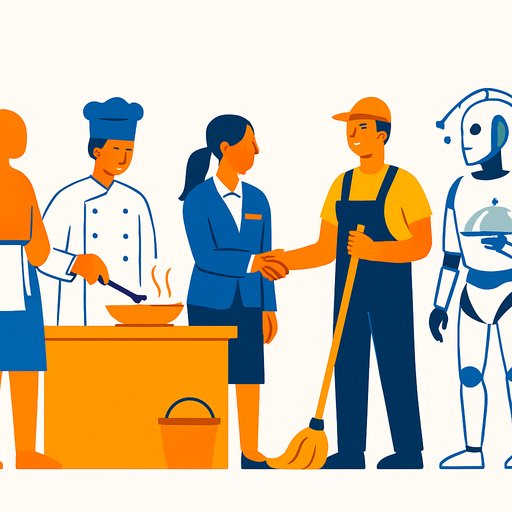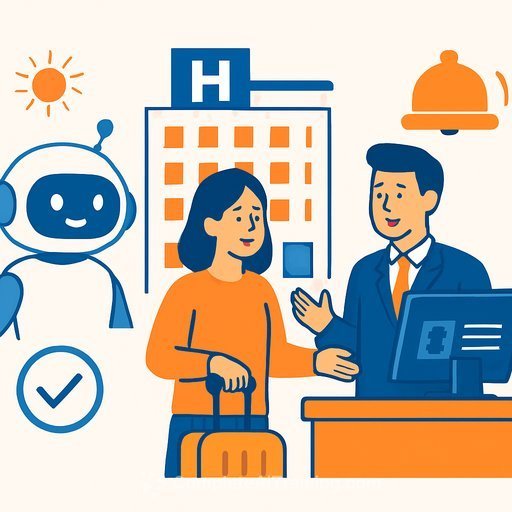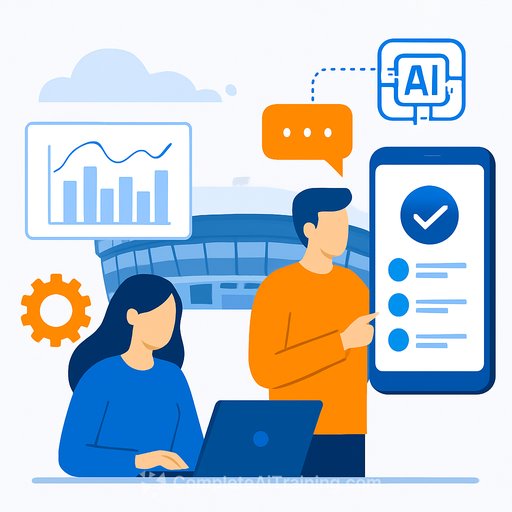Top 5 Hospitality Jobs in Baton Rouge Most at Risk from AI — And How to Adapt
Too Long; Didn't Read:
In Baton Rouge's hospitality sector, jobs like accounting, HR, front desk clerks, administrative staff, and housekeeping face significant AI disruption. Automation is impacting up to 51% of hotel operations. Adapting by upskilling in AI tools and data literacy is essential to stay competitive.
AI is changing how Baton Rouge’s hospitality industry operates, affecting both daily tasks and long-term strategies. The Downtown Development District uses AI to analyze visitor patterns, showing how technology supports smarter decision-making in tourism and urban planning.
At the 2025 LSU “AI in Action” symposium, experts emphasized the urgency for workers to learn AI skills. The key takeaway: those who understand AI will have an advantage in the job market.
AI tools like virtual assistants, dynamic pricing, and guest personalization are becoming standard in Baton Rouge hotels, improving guest experiences and operational efficiency. For hospitality workers, gaining skills in AI and data literacy is critical. Programs like those offered at Complete AI Training can help professionals develop these skills.
How We Identified the Top 5 Hospitality Jobs at AI Risk
The list of jobs most vulnerable to AI in Baton Rouge was created by combining industry-wide trends with local hospitality insights. Sources like HotelTechReport show AI tools such as chatbots and predictive pricing are automating repetitive tasks in front desk, revenue management, and housekeeping.
Data from MARA Solutions indicates about 51% of hotels aim to improve operations through AI, especially in front office and sales roles. Research from EHL Hospitality Insights highlights that AI mainly automates routine bookings, scheduling, and maintenance—tasks common in many hospitality jobs.
This research reflects both global AI trends and Baton Rouge's unique hospitality environment, helping workers and employers prepare for the changes ahead.
1. Accounting and Bookkeeping Roles
Accounting and bookkeeping jobs in Baton Rouge hotels are shifting as AI automates tasks like data entry, ledger reconciliation, and invoice processing. Studies show AI can handle nearly 40% of these duties, improving accuracy and freeing accountants to focus on analysis and planning.
With a shrinking pool of accounting talent—over 300,000 accountants have left the profession recently—AI tools such as Puzzle and Docyt are helping businesses manage financial workflows in real time.
Rather than replacing accountants, AI is augmenting their roles. Hospitality professionals who upskill in AI tools will provide better financial insights and help businesses grow as Baton Rouge's hospitality sector expands.
2. Human Resources and Payroll Clerks
HR and payroll roles are also affected by AI automations that streamline candidate screening, interview scheduling, and payroll calculations. Nearly half of hospitality companies use AI recruitment tools to predict candidate success and reduce turnover—key in Louisiana’s high-turnover hospitality jobs.
AI improves payroll accuracy and compliance by automating data entry and tracking regulatory changes. Chatbots provide real-time employee support, and AI-driven scheduling helps manage seasonal staffing efficiently.
To stay relevant, HR teams in Baton Rouge should build skills in AI management while maintaining fairness and personal connection in hiring and payroll processes.
3. Administrative and Executive Secretarial Roles
Routine admin tasks such as scheduling, data management, and guest communication are increasingly automated by AI-powered virtual assistants and chatbots. These tools free managers to focus on strategic priorities and customer interaction.
Studies show about 60% of hotels use AI to boost efficiency by automating back-office functions traditionally handled by secretarial staff. Challenges remain, including staff resistance and privacy concerns, making reskilling and adaptation necessary.
Success in these roles will rely on digital literacy and the ability to work alongside AI systems while preserving the human touch in hospitality.
4. Cashiers and Front Desk Clerks
Self-service kiosks are transforming cashier and front desk roles by automating check-in/out and order-taking. These kiosks reduce wait times, increase average transaction values by 20-30%, and improve service hours and accessibility.
While kiosks handle routine tasks, staff can focus on delivering personalized service, improving job satisfaction. This shift also helps address labor shortages, which remain a challenge in Baton Rouge hospitality.
Kiosk adoption aligns with a national trend toward digital transformation in hospitality, with kiosk shipments growing 25% during the COVID-19 pandemic and expected to grow steadily.
5. Housekeepers and Facility Maintenance Jobs
AI and robotics are changing housekeeping and maintenance by introducing autonomous cleaning robots and smart building tech. Robots can work around the clock, maintaining hygiene and reducing manual labor and chemical exposure.
IoT sensors and data analytics help optimize energy use and predict maintenance needs, making hotel operations more efficient and sustainable.
While these tools reduce labor demand, workers can adapt by overseeing AI devices, focusing on guest services that robots can't provide, and building tech skills to enhance operations.
How to Adapt and Thrive Amid AI Changes in Baton Rouge Hospitality
AI will continue to reshape hospitality jobs, but workers who embrace technology and build new skills will thrive. AI tools improve efficiency and guest experiences but require staff to be digitally literate and comfortable managing AI alongside customers.
Training programs like the 15-week AI Essentials for Work bootcamp offered by Complete AI Training provide practical AI skills without needing a technical background. Such programs prepare hospitality professionals for a future where AI and human service work side by side.
Frequently Asked Questions
- Which hospitality jobs in Baton Rouge are most at risk due to AI automation?
Accounting and bookkeeping, human resources and payroll clerks, administrative and executive secretarial roles, cashiers and front desk clerks, and housekeeping and facility maintenance jobs face the highest risk. - How is AI transforming accounting and bookkeeping jobs in Baton Rouge hospitality?
AI automates data entry, ledger reconciliation, and invoice processing, improving accuracy and efficiency. This allows accountants to focus on financial analysis and strategic tasks. - What impact does AI have on frontline roles like cashiers and front desk clerks?
Self-service kiosks handle routine check-in and order tasks, reducing wait times and increasing transaction values. Staff can then concentrate on personalized guest service. - How can hospitality workers in Baton Rouge adapt to AI-driven changes?
By learning AI-related skills such as data literacy and tool proficiency, participating in upskilling programs, and focusing on roles requiring human judgment and service. - What are the benefits and challenges of AI adoption in Baton Rouge's hospitality industry?
Benefits include greater efficiency, cost reduction, better guest experiences, and improved workforce management. Challenges involve balancing automation with human oversight, addressing staff concerns, ensuring data privacy, and the need for continuous training.
Your membership also unlocks:






